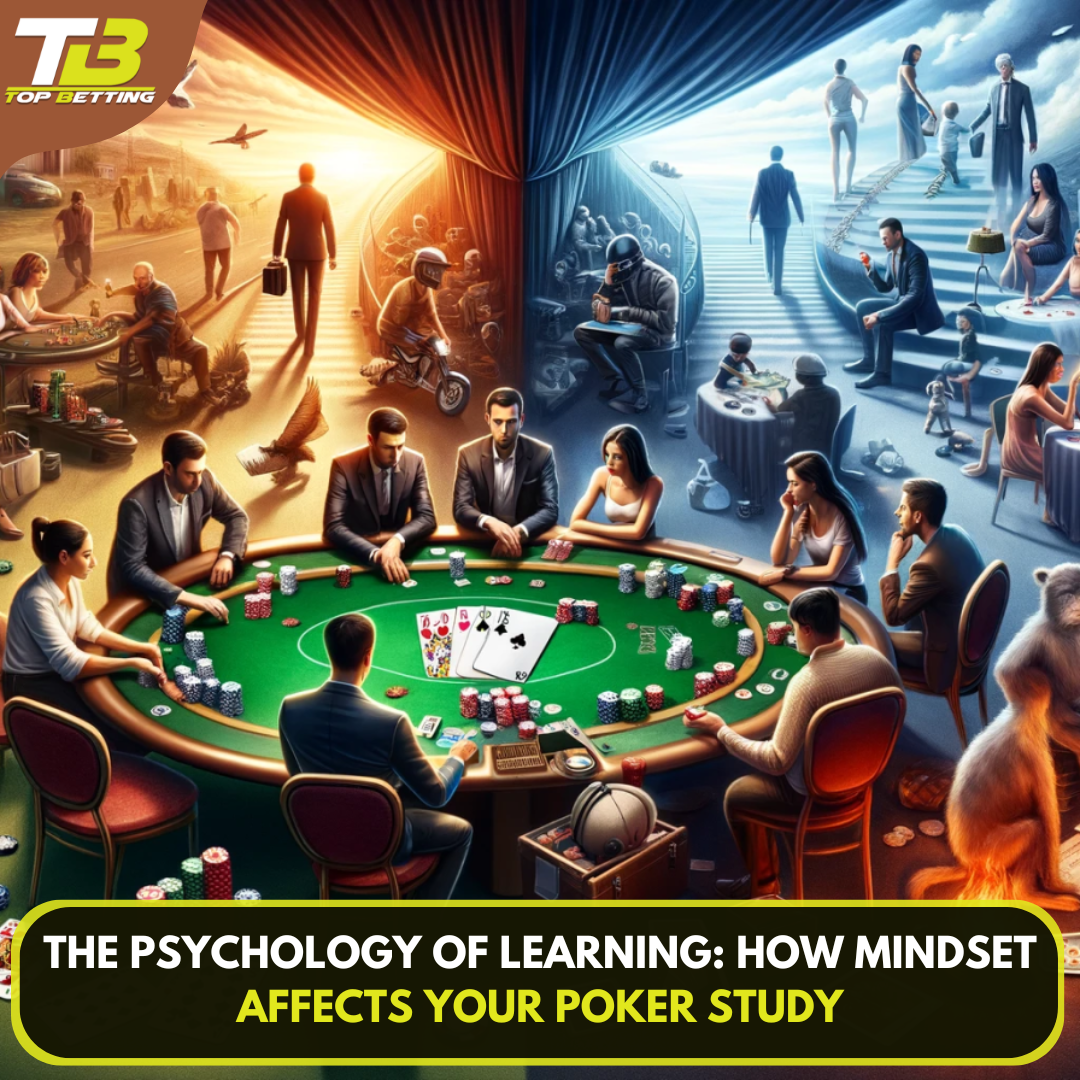
The Psychology of Learning and Mindset and Poker Study
Are you ready to take your poker game to the next level? It’s not just about studying the technical aspects of the game; it’s also about understanding how your mindset affects your learning process. In this article, we delve into the fascinating field of psychology and explore how different mindsets can either hinder or enhance your poker study.
The Importance of Mindset in Poker Study
When it comes to learning, a fixed mindset can be a roadblock to progress. Thinking that you either have what it takes to be a great poker player or you don’t can limit your potential for growth. On the other hand, adopting a growth mindset, where you believe that your abilities can be developed through dedication and hard work, can lead to significant improvements in your poker study.
A fixed mindset tends to view intelligence and skills as innate traits that are fixed and unchangeable. This mindset can discourage effort and resilience, as individuals believe that their abilities are predetermined. In the context of poker study, a fixed mindset may lead to frustration and a lack of motivation when faced with challenges or setbacks.
In contrast, a growth mindset embraces the idea that intelligence and skills can be developed through continuous learning and effort. This mindset encourages individuals to embrace challenges, persist in the face of obstacles, and seek out opportunities for growth. By cultivating a growth mindset in your poker study, you open yourself up to a world of possibilities and improvement.
Developing a growth mindset in poker study requires a shift in perspective. Instead of viewing mistakes as failures, see them as valuable learning opportunities. Embrace challenges as a chance to stretch your abilities and develop new strategies. By adopting this mindset, you’ll approach your poker study with a sense of curiosity and a hunger for growth.
How Mindset Affects Motivation and Perseverance in Poker Study
Motivation and perseverance are key factors in successful poker study. Without the right mindset, it can be challenging to stay committed and overcome obstacles along the way. A fixed mindset can lead to a fear of failure, causing individuals to avoid difficult tasks or give up easily when faced with setbacks.
On the other hand, a growth mindset fosters a sense of determination and resilience. When you believe that your efforts can lead to improvement, you’re more likely to stay motivated and persevere through challenges. With a growth mindset, setbacks become stepping stones to success, and failures become opportunities for growth.
To cultivate motivation and perseverance in your poker study, it’s essential to set realistic goals and celebrate small victories along the way. Break down your study sessions into manageable tasks and focus on the process rather than just the outcome. By shifting your mindset to embrace the journey of learning, you’ll maintain your motivation and stay committed to improving your poker skills.
Strategies for Developing a Growth Mindset in Poker Study

Developing a growth mindset in poker study is not an overnight process, but there are strategies you can employ to facilitate this transformation. Here are some strategies to help you develop and strengthen your growth mindset:
Embrace challenges: Instead of avoiding difficult situations, actively seek out challenges that push your boundaries. Embracing challenges allows you to develop new skills and expand your knowledge base.
View mistakes as learning opportunities: Instead of dwelling on your failures, analyze them as valuable lessons. Reflect on what went wrong and how you can improve in the future. Embracing mistakes as part of the learning process will help you grow and evolve as a poker player.
Cultivate a love for learning: Approach your poker study with a sense of curiosity and a desire to acquire new knowledge. Actively seek out resources, such as books, articles, and videos, to expand your understanding of the game.
Practice self-reflection: Regularly take the time to reflect on your progress and areas that need improvement. Self-reflection allows you to identify patterns, adjust your strategies, and grow as a player.
Surround yourself with growth-minded individuals: Seek out like-minded individuals who share your passion for learning and growth. Surrounding yourself with people who have a growth mindset will inspire and motivate you on your poker study journey.
By implementing these strategies consistently, you’ll gradually shift your mindset from fixed to growth, unlocking your full potential as a poker player.
The Role of Self-Reflection and Self-Awareness in Improving Poker Study
Self-reflection and self-awareness play a crucial role in improving your poker study. By taking the time to reflect on your strengths, weaknesses, and areas for improvement, you gain valuable insights into your learning process.
Self-reflection allows you to identify patterns in your study habits and recognize what strategies are effective for you. It helps you understand how you learn best, whether it’s through visual aids, hands-on practice, or verbal explanations. By being aware of your preferred learning style, you can tailor your study sessions to optimize your understanding and retention of poker concepts.
Self-awareness is also essential in recognizing and managing your emotions during the learning process. Poker study can be challenging, and it’s natural to feel frustrated or discouraged at times. However, by cultivating self-awareness, you can identify when negative emotions arise and develop strategies to address them.
For example, if you notice that you become easily frustrated when studying a particular concept, take a step back and approach it from a different angle. Seek alternative resources or consult with fellow poker players to gain a fresh perspective. By acknowledging and managing your emotions, you’ll be better equipped to maintain focus and productivity during your study sessions.
Overcoming Challenges and Setbacks with a Growth Mindset

Challenges and setbacks are inevitable in any learning journey, including poker study. However, with a growth mindset, you can approach these obstacles as opportunities for growth and improvement.
When faced with a challenge or setback, take a moment to assess the situation objectively. Instead of dwelling on the negative aspects, focus on what you can learn from the experience. Ask yourself what steps you can take to overcome the challenge or prevent similar setbacks in the future.
It’s important to remember that setbacks are not indicative of failure but rather part of the learning process. By adopting a growth mindset, you’ll be able to bounce back from setbacks more quickly and use them as stepping stones to success.
The Impact of Mindset on Decision-Making and Risk-Taking in Poker
Mindset not only affects your learning process but also your decision-making and risk-taking abilities in poker. A fixed mindset can lead to a fear of making mistakes or taking risks, as individuals are afraid of being seen as incompetent or unsuccessful.
In contrast, a growth mindset encourages individuals to take calculated risks and make informed decisions. With a growth mindset, you understand that mistakes are an essential part of the learning process and that taking risks can lead to valuable experiences and insights.
To cultivate a growth mindset in your decision-making and risk-taking, it’s crucial to focus on the process rather than just the outcome. Instead of solely evaluating the success or failure of a decision, reflect on the reasoning behind it and what you can learn from the experience. By adopting this mindset, you’ll become a more confident and strategic poker player.
The Power of Positive Thinking and Visualization in Poker Study
Positive thinking and visualization can be powerful tools in optimizing your poker study. When you approach your study sessions with a positive mindset, you’re more likely to be engaged, focused, and receptive to new information.
Visualizing success can also enhance your learning experience. Take a moment before each study session to visualize yourself making progress, understanding complex concepts, and winning at the poker table. By visualizing success, you program your mind to believe in your abilities and increase your confidence.
Incorporate positive affirmations into your study routine. Repeat statements such as “I am capable of mastering poker strategies” or “I am dedicated to improving my skills” to reinforce a positive mindset and boost your motivation.

Conclusion
The psychology of learning serves as a cornerstone in your poker journey. Embracing a growth mindset is pivotal, as it enables you to unlock your full potential and expedite your development as a player. By welcoming challenges, regarding mistakes as opportunities for growth, and fostering self-reflection and self-awareness, you can optimize your study sessions effectively. Setbacks become mere stepping stones when approached with resilience, transforming them into catalysts for success. Infusing your decision-making and risk-taking with a growth-oriented mindset enhances your strategic prowess on the poker table. Additionally, harnessing the power of positive thinking and visualization amplifies your learning experience, propelling you toward mastery.
Beyond enhancing your poker skills, adopting a growth mindset nurtures essential life skills. It cultivates perseverance, adaptability, and a hunger for continuous improvement—qualities that transcend the confines of the poker table. By embracing this mindset, you not only elevate your gameplay but also embark on a journey of personal growth and development. Thus, in your pursuit of poker excellence, the psychology of learning and the embrace of a growth mindset are indispensable allies, guiding you toward both success at the table and enrichment in life.










